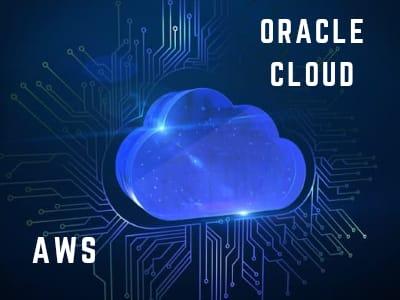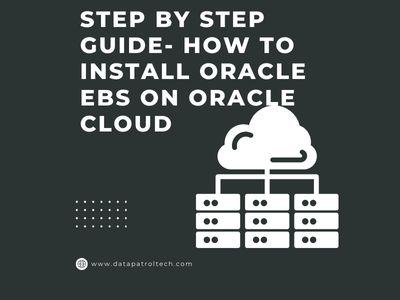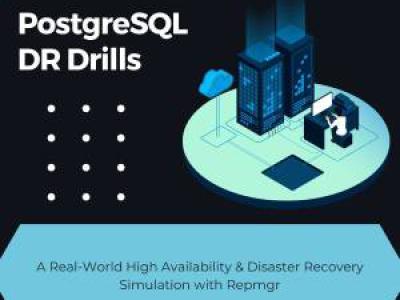- April 18, 2024
by Maneesh Joglekar, Sr. Account Manager - Data Patrol Technologies
- Oracle Cloud
- Amazon Web Services (AWS)
- Key Distinctions
- Oracle Cloud Services
- AWS Cloud Services
- Tailoring solutions to organizational needs
- Features of Oracle cloud services and AWS
- Conclusion

EXPLORING CLOUD SERVICE OFFERINGS: AN OVERVIEW WITH FOCUS ON AWS
Oracle Cloud and Amazon Web Services (AWS) are both prominent cloud computing platforms offering a wide range of services to organizations. Here's an overview of each and their key differences.
-
-
ORACLE CLOUD:
- Oracle Cloud is a cloud computing platform offered by Oracle Corporation, one of the world's largest enterprise software vendors.
- It provides a comprehensive suite of cloud services, including infrastructure as a service (IaaS), platform as a service (PaaS), and software as a service (SaaS).
- Oracle Cloud offers services such as computing, storage, networking, databases, analytics, application development, and more.
- It emphasizes its integration with Oracle's other products and services, such as its database technology (Oracle Database) and enterprise applications (e.g., Oracle ERP, Oracle CRM).
- Oracle Cloud is known for its strong focus on enterprise customers and its ability to handle mission-critical workloads.
-
AMAZON WEB SERVICES (AWS):
- AWS is a cloud computing platform offered by Amazon.com Inc., one of the largest technology companies globally.
- It is the largest and most widely adopted cloud platform, offering a vast array of services across computing, storage, databases, analytics, machine learning, IoT, security, and more.
- AWS pioneered the concept of utility-based cloud computing, allowing users to pay only for the resources they consume on a pay-as-you-go basis.
- It has a massive global infrastructure with data centres located in multiple regions worldwide, enabling high availability and low latency for users across the globe.
- AWS is known for its scalability, reliability, and extensive ecosystem of third-party integrations and services.
-
-
-
KEY DISTINCTIONS:
- Product Portfolio: While both Oracle Cloud and AWS offer a wide range of cloud services, Oracle Cloud often emphasizes its integration with Oracle's technologies, whereas AWS has a broader ecosystem with a vast array of services and third-party integrations.
- Market Position: AWS is the dominant player in the cloud computing market, with a larger market share and a more extensive global footprint compared to Oracle Cloud.
- Target Audience: Oracle Cloud tends to target enterprise customers, especially those already using Oracle technologies, while AWS serves a broader range of customers, from startups to large enterprises.
-
Businesses across various industries can benefit from using Oracle Cloud and AWS services, depending on their specific requirements and objectives.
Here are some examples of businesses that commonly utilize these cloud platforms:
-
- Enterprise Organizations
- Startups and Small Businesses
- E-commerce Companies
- Software as a Service (SaaS) Providers
- Media and Entertainment Industry
- Financial Services
- Healthcare Providers
Overall, businesses of all sizes and industries can benefit from the flexibility, scalability, and innovation offered by Oracle Cloud and AWS services to drive digital transformation, enhance operational efficiency, and deliver value to customers.
Both Oracle Cloud and AWS offer a wide range of cloud services across multiple categories to cater to the diverse needs of businesses.
Here's an overview of the types of services provided by each cloud platform:
-
-
ORACLE CLOUD SERVICES:
-
-
-
-
COMPUTE SERVICES:
- Oracle Compute: Provides virtual machines (VMs) and bare metal instances for running applications and workloads.
- Oracle Container Engine: Manages Docker containers and Kubernetes clusters for deploying and scaling containerized applications.
-
STORAGE SERVICES:
- Oracle Object Storage: Scalable, durable storage for storing unstructured data such as documents, images, and backups.
- Oracle Block Volumes: High-performance block storage for use with compute instances.
- Oracle File Storage: Fully managed file storage service for NFS-based file systems.
-
DATABASE SERVICES:
- Oracle Database Cloud Service: Fully managed Oracle Database instances with options for autonomous, dedicated, and shared deployments.
- Oracle Autonomous Data Warehouse: Self-driving data warehouse service for analytics and business intelligence.
- Oracle Autonomous Transaction Processing: Self-driving database service optimized for transactional workloads.
-
NETWORKING SERVICES:
- Oracle Virtual Cloud Network (VCN): Virtual private network for connecting resources within Oracle Cloud.
- Oracle Load Balancer: Distributes incoming traffic across multiple compute instances to ensure high availability and scalability.
-
ANALYTICS AND AI SERVICES:
- Oracle Analytics Cloud: Platform for self-service analytics, data visualization, and business intelligence.
- Oracle Machine Learning: Enables data scientists and developers to build, train, and deploy machine learning models.
-
APPLICATION DEVELOPMENT SERVICES:
- Oracle Cloud Infrastructure (OCI) Functions: Serverless computing service for building and running event-driven applications.
- Oracle Developer Cloud Service: Collaboration platform for managing software development projects using DevOps practices.
-
-
-
-
AWS CLOUD SERVICES:
-
COMPUTE SERVICES:
- Amazon EC2 (Elastic Compute Cloud): Provides resizable compute capacity in the cloud, including virtual machines and containers.
- AWS Lambda: Serverless computing service for running code in response to events without provisioning or managing servers.
-
STORAGE SERVICES:
- Amazon S3 (Simple Storage Service): Object storage service for storing and retrieving any amount of data.
- Amazon EBS (Elastic Block Store): Block storage volumes for use with EC2 instances.
-
DATABASE SERVICES:
- Amazon RDS (Relational Database Service): Managed database service for MySQL, PostgreSQL, Oracle, SQL Server, and others.
- Amazon DynamoDB: Fully managed NoSQL database service for scalable and high-performance applications.
-
NETWORKING SERVICES:
- Amazon VPC (Virtual Private Cloud): Virtual network for isolating resources within the AWS cloud.
- Elastic Load Balancing: Automatically distributes incoming application traffic across multiple targets to ensure high availability.
-
ANALYTICS AND AI SERVICES:
- Amazon Redshift: Fully managed data warehouse service for analytics and business intelligence.
- Amazon SageMaker: Fully managed service for building, training, and deploying machine learning models.
-
APPLICATION DEVELOPMENT SERVICES:
- AWS Lambda: Serverless computing service for running code in response to events without provisioning or managing servers.
- Amazon API Gateway: Fully managed service for creating, publishing, maintaining, monitoring, and securing APIs at any scale.
-
-
These are just a few examples of the extensive portfolio of Oracle Cloud and AWS services offered. Both platforms continuously innovate and expand their offerings to meet the evolving needs of businesses in the digital age.
TAILORING SOLUTIONS TO ORGANIZATIONAL NEEDS: AWS/ ORACLE CLOUD
Determining which is the perfect Cloud, depends on the specific needs and preferences of an organization. Each cloud platform has its strengths and weaknesses However the preferred cloud would depend on certain scenarios:
-
- INTEGRATED SOLUTIONS FOR ORACLE WORKLOADS: Organizations heavily invested in Oracle technologies may find Oracle Cloud Services more appealing due to their tight integration with Oracle's database, applications, and middleware products. This integration can simplify deployment, management, and licensing for Oracle workloads.
- AUTONOMOUS DATABASE OFFERING: Oracle's Autonomous Database is a unique offering that provides self-driving, self-securing, and self-repairing capabilities, reducing the need for manual administration and optimizing performance and security. This may be advantageous for organizations seeking a fully managed database solution with minimal overhead.
- ENTERPRISE-GRADE SUPPORT AND SLAS: Oracle Cloud may be preferred by enterprise customers who require high levels of support and service level agreements (SLAs). Oracle offers comprehensive support options and guarantees for uptime, performance, and response times, which can be crucial for mission-critical workloads.
- COMPLIANCE AND SECURITY: Oracle Cloud Services may be chosen by organizations operating in heavily regulated industries or those with strict security requirements. Oracle provides a range of compliance certifications and security features to help customers meet regulatory obligations and protect sensitive data.
- CUSTOMIZATION AND FLEXIBILITY: Oracle Cloud offers customizable service packages and flexible deployment options, allowing organizations to tailor their cloud environment to suit their needs. This flexibility can be advantageous for businesses with unique requirements or complex IT architectures.
- INTEGRATED SOLUTIONS FOR ORACLE WORKLOADS: Organizations heavily invested in Oracle technologies may find Oracle Cloud Services more appealing due to their tight integration with Oracle's database, applications, and middleware products. This integration can simplify deployment, management, and licensing for Oracle workloads.
It's important to note that AWS remains the market leader in cloud computing with the widest range of services, global infrastructure, and extensive ecosystem. Many businesses, regardless of their use of Oracle technologies, find AWS to be a more suitable choice due to its maturity, scalability, and breadth of offerings.
Ultimately, organizations should carefully evaluate their requirements, consider factors such as performance, cost, scalability, and support, and conduct thorough comparisons between Oracle Cloud Services and AWS to determine which cloud platform best meets their needs.
CERTAINLY! BELOW ARE THE KEY FEATURES OF ORACLE CLOUD SERVICES AND AWS:
-
-
-
COMPUTE SERVICES:
- Oracle Cloud: Offers virtual machines (VMs) and bare metal instances with options for both general-purpose and specialized workloads. Provides Oracle VMs for optimized performance with Oracle software.
- AWS: Provides Amazon EC2 with a wide variety of instance types optimized for different use cases, including general-purpose, compute-optimized, memory-optimized, and GPU instances.
-
STORAGE SERVICES:
- Oracle Cloud: Offers Object Storage, Block Volumes, and File Storage services for storing various types of data. Provides high-performance, durable storage with options for data encryption and data transfer acceleration.
- AWS: Provides Amazon S3 for object storage, Amazon EBS for block storage, and Amazon EFS for file storage. Offers scalable and reliable storage options with features like versioning, lifecycle policies, and access control.
-
DATABASE SERVICES:
- Oracle Cloud: Offers a range of database services, including Oracle Autonomous Database, Oracle Database Cloud Service, MySQL Database Service, and NoSQL Database Service. Provides fully managed, self-driving database solutions with options for autonomous, dedicated, and shared deployments.
- AWS: Provides Amazon RDS for managed relational databases (MySQL, PostgreSQL, Oracle, SQL Server, etc.), Amazon DynamoDB for managed NoSQL databases, and Amazon Redshift for managed data warehousing. Offers scalable and high-performance database solutions with automated backups, monitoring, and scaling.
-
NETWORKING SERVICES:
- Oracle Cloud: Offers Virtual Cloud Network (VCN) for creating private networks, Load Balancer for distributing traffic across multiple instances, and Fast Connect for dedicated network connections between on-premises and cloud environments.
- AWS: Provides Amazon VPC for creating isolated virtual networks, Elastic Load Balancing for distributing traffic, and AWS Direct Connect for dedicated network connections. Offers comprehensive networking services with options for high availability, security, and performance.
-
ANALYTICS AND AI SERVICES:
- Oracle Cloud: Offers Oracle Analytics Cloud for self-service analytics, Oracle Machine Learning for building and deploying machine learning models, and Oracle Data Science for collaborative data science projects.
- AWS: Provides Amazon Redshift for data warehousing, Amazon SageMaker for building, training, and deploying machine learning models, and Amazon QuickSight for business intelligence and data visualization. Offers a wide range of analytics and AI services for processing and analyzing large datasets.
-
APPLICATION DEVELOPMENT SERVICES:
- Oracle Cloud: Offers OCI Functions for serverless computing, Developer Cloud Service for managing software development projects, and Application Performance Monitoring for monitoring application performance.
- AWS: Provides AWS Lambda for serverless computing, AWS CodeCommit for source code management, and AWS CodePipeline for continuous integration and continuous delivery (CI/CD). Offers a comprehensive set of tools and services for building, deploying, and managing applications.
-
-
CONCLUSION:
In conclusion, the choice between Oracle Cloud Services and AWS ultimately depends on the unique requirements and preferences of each organization. Both cloud platforms offer a wide array of services tailored to meet the diverse needs of businesses across various industries. While Oracle Cloud Services may be preferred in scenarios requiring tight integration with Oracle technologies, enterprise-grade support, compliance, or autonomous database capabilities, AWS remains the competent player in the cloud computing market, offering a broader ecosystem, extensive global infrastructure, and scalability.
To navigate this decision effectively, organizations should carefully evaluate their specific needs and objectives, considering factors such as performance, cost, security, scalability, and support. Additionally, seeking guidance from trusted partners like DataPatrol Technologies can provide valuable insights and expertise in understanding database needs and optimizing cloud infrastructure.
DataPatrol Technologies offers customizable service packages, specialized remote DBA services, and certified experts available 24/7 to assist organizations in leveraging Oracle Cloud or AWS effectively to drive digital transformation, enhance operational efficiency, and achieve their business goals.
By conducting a thorough analysis and leveraging the expertise of trusted partners like DataPatrol Technologies, businesses can make informed decisions and harness the full potential of cloud computing to stay competitive and innovative in the dynamic landscape of 2024 and beyond.
For more details connect with Data Patrol Technologies at info@datapatroltech.com or call us on


